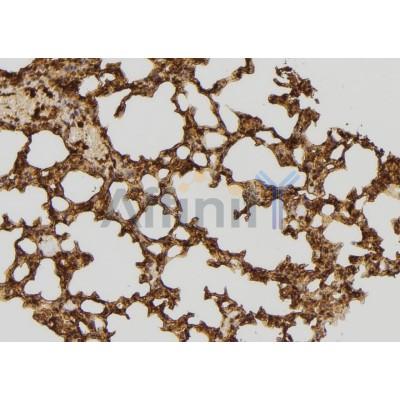RFC4 Antibody - #DF7367
| Product: | RFC4 Antibody |
| Catalog: | DF7367 |
| Description: | Rabbit polyclonal antibody to RFC4 |
| Application: | WB IHC |
| Reactivity: | Human, Mouse, Rat, Monkey |
| Prediction: | Pig, Bovine, Horse, Rabbit, Dog, Xenopus |
| Mol.Wt.: | 39kDa; 40kD(Calculated). |
| Uniprot: | P35249 |
| RRID: | AB_2839305 |
Related Downloads
Protocols
Product Info
*The optimal dilutions should be determined by the end user. For optimal experimental results, antibody reuse is not recommended.
*Tips:
WB: For western blot detection of denatured protein samples. IHC: For immunohistochemical detection of paraffin sections (IHC-p) or frozen sections (IHC-f) of tissue samples. IF/ICC: For immunofluorescence detection of cell samples. ELISA(peptide): For ELISA detection of antigenic peptide.
Cite Format: Affinity Biosciences Cat# DF7367, RRID:AB_2839305.
Fold/Unfold
A1 37; A1 37 kDa subunit; Activator 1 37; Activator 1 37 kDa subunit; Activator 1 subunit 4; Replication factor C 37; Replication factor C 37 kDa subunit; Replication factor C subunit 4; Replication factor C4; RF-C 37 kDa subunit; RFC 37; RFC37; RFC4 replication factor C (activator 1)4 37kDa; RfC4; RFC4_HUMAN;
Immunogens
A synthesized peptide derived from human RFC4, corresponding to a region within the internal amino acids.
- P35249 RFC4_HUMAN:
- Protein BLAST With
- NCBI/
- ExPASy/
- Uniprot
MQAFLKGTSISTKPPLTKDRGVAASAGSSGENKKAKPVPWVEKYRPKCVDEVAFQEEVVAVLKKSLEGADLPNLLFYGPPGTGKTSTILAAARELFGPELFRLRVLELNASDERGIQVVREKVKNFAQLTVSGSRSDGKPCPPFKIVILDEADSMTSAAQAALRRTMEKESKTTRFCLICNYVSRIIEPLTSRCSKFRFKPLSDKIQQQRLLDIAKKENVKISDEGIAYLVKVSEGDLRKAITFLQSATRLTGGKEITEKVITDIAGVIPAEKIDGVFAACQSGSFDKLEAVVKDLIDEGHAATQLVNQLHDVVVENNLSDKQKSIITEKLAEVDKCLADGADEHLQLISLCATVMQQLSQNC
Predictions
Score>80(red) has high confidence and is suggested to be used for WB detection. *The prediction model is mainly based on the alignment of immunogen sequences, the results are for reference only, not as the basis of quality assurance.
High(score>80) Medium(80>score>50) Low(score<50) No confidence
Research Backgrounds
The elongation of primed DNA templates by DNA polymerase delta and epsilon requires the action of the accessory proteins proliferating cell nuclear antigen (PCNA) and activator 1. This subunit may be involved in the elongation of the multiprimed DNA template.
Nucleus.
Belongs to the activator 1 small subunits family.
Research Fields
· Genetic Information Processing > Replication and repair > DNA replication.
· Genetic Information Processing > Replication and repair > Nucleotide excision repair.
· Genetic Information Processing > Replication and repair > Mismatch repair.
References
Restrictive clause
Affinity Biosciences tests all products strictly. Citations are provided as a resource for additional applications that have not been validated by Affinity Biosciences. Please choose the appropriate format for each application and consult Materials and Methods sections for additional details about the use of any product in these publications.
For Research Use Only.
Not for use in diagnostic or therapeutic procedures. Not for resale. Not for distribution without written consent. Affinity Biosciences will not be held responsible for patent infringement or other violations that may occur with the use of our products. Affinity Biosciences, Affinity Biosciences Logo and all other trademarks are the property of Affinity Biosciences LTD.


